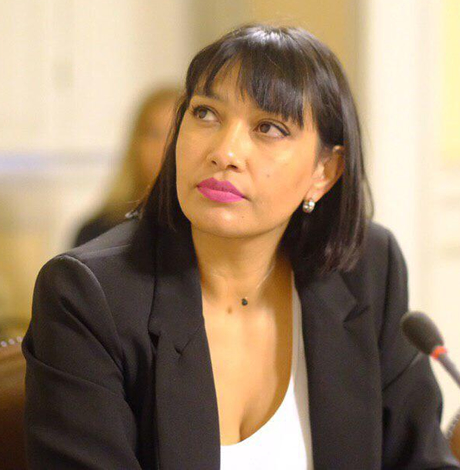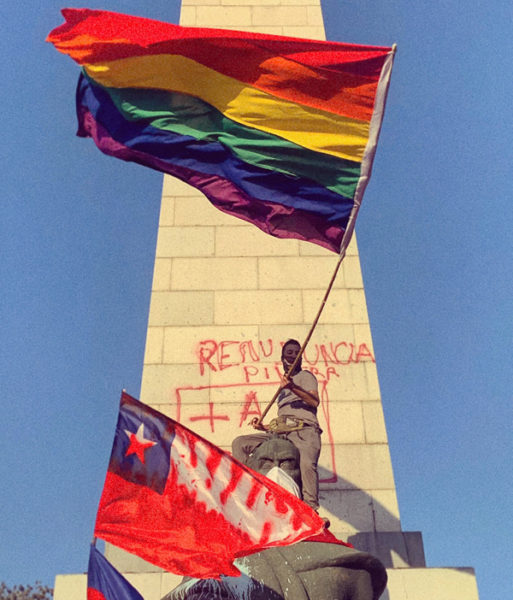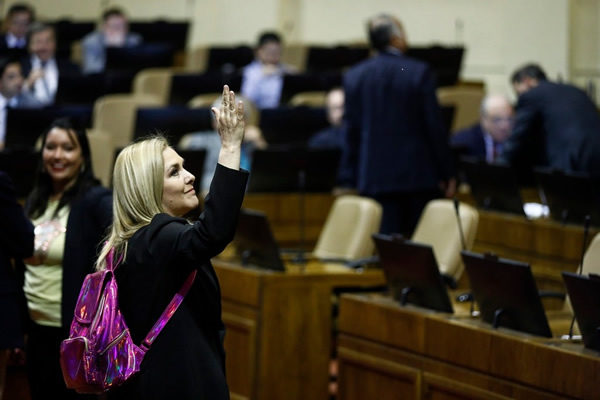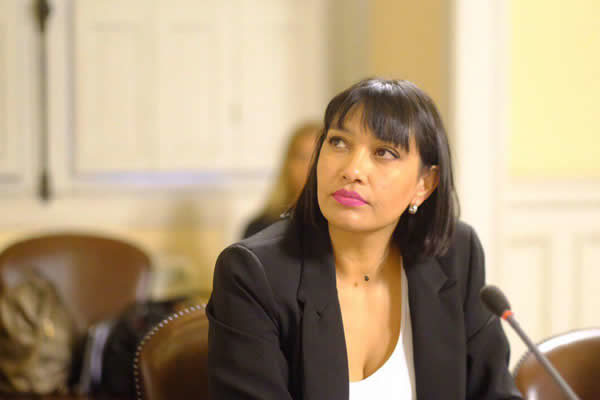News
La reivindicación de derechos y violencia contra LGBTQ marcan la crisis política en Chile
Activistas han participado en manifestaciones contra el gobierno de Piñera


CONCEPCIÓN, Chile — En menos de tres días una manifestación convocada por estudiantes contra el aumento en las tarifas del metro se convirtió en una imponente e inesperada protesta nacional por años de desigualdades en Chile, paralizando al país por completo y poniendo en jaque a toda la clase política chilena. Millones de personas han salido a las calles en los últimos días para manifestar su descontento.
Sin embargo, algunas de las masivas marchas han terminado con manifestantes atacando negocios, incendiando y saqueando supermercados en la peor revuelta que se ha visto en el país en décadas. En respuesta, el presidente de Chile, Sebastián Piñera, decretó Estado de Emergencia sacando a los militares a las calles y sumó un toque de queda que profundizó el conflicto desencadenando en los peores episodios de violación de Derechos Humanos en los últimos 30 años en país latinoamericano. Un grupo de congresistas anunció el domingo una acusación constitucional contra Piñera.
“Estás semanas han sido una bomba de tiempo que todos sabíamos que iba explotar, pero no sabíamos que explotaría ahora y con esta intensidad”, dice Alessia Injoque, presidenta ejecutiva de Fundación Iguales, una organización LGBTQ chilena. Similar opinión tiene Franco Fuica, coordinador de legislación y políticas públicas de Organizando Trans Diversidades (OTD), “estamos viviendo una revolución social”, afirma.
La crisis en Chile, se arrastra hace mucho tiempo. En 1973 el dictador Augusto Pinochet realizó un golpe de Estado para derrocar a Salvador Allende, el primer presidente socialista electo democráticamente en América Latina. Pinochet dio marcha atrás al modelo de Allende y comenzó a implementar una fórmula económica diametralmente opuesta, el país se convirtió en una especie de laboratorio del neoliberalismo e inició una cruel dictadura que persiguió, torturó y mató a sus opositores.
Los cambios económicos de Pinochet fueron liderados por un grupo de economistas liberales educados en la Universidad de Chicago, donde aprendieron de las ideas de los estadounidenses Milton Friedman y Arnold Harberger, los “Chicago boys” implementaron reformas económicas y sociales que todo lo privatizó, las cuales fueron selladas en la Constitución Política de la República de Chile de 1980, que permanece vigente.
Chile es el único país en el mundo en que el agua es privada, las pensiones de jubilación son bajas, hay mala salud y la mayoría de los hogares tienen dificultades para llegar a fin de mes. Un informe publicado en enero de este año por la Comisión Económica de América Latina y el Caribe (Cepal), que analizó la evolución de la pobreza, el gasto y la inclusión social, reveló que Chile sigue manteniendo sus altos índices de desigualdad. “El 1 por ciento de la población concentra el 26,5 por ciento de la riqueza”, concluyó la investigación.
“Llevamos años en un sistema injusto, donde todo está hecho para que siempre ganen los mismos. Más allá de esa injusticia hubo impunidad, donde no pasó nada con personas que hicieron mucho daño, paso del dolor a la frustración, el gobierno fue indolente y todo reventó”, aclara Injoque. La activista trans sinceró haber sentir miedo “me dio escalofríos cuando supe que los militares saldrían a las calles” recuerda.
“Piñera le declaró la guerra a mis nietos por cadena nacional, mandó al Ejército a dispararles a matar por manifestar pacíficamente su enorme sufrimiento y al pueblo le está pareciendo que hay complicidad ahí y yo escuchó otra voz generalizada: ‘renuncia Piñera'”, dijo al Washington Blade, Pamela Jiles (Frente Amplio, una nueva fuerza política en el Congreso de Chile), quién ha liderado el impeachment.
“Mi deber como parlamentaria es acusar constitucionalmente a Piñera, como lo habría hecho la diputada humanista Laura Rodríguez, utilizando una atribución parlamentaria y un instrumento constitucional, de espaldas a la élite y de cara al pueblo”, explicó Jiles. “No puede ser de otro modo ya que ha puesto en grave peligro la seguridad de la nación, ha sumido el país en el desgobierno y es el principal -aunque no único- responsable de las muertes de quienes debía proteger”.
Desde el estallido de esta revolución social se han reportado brutales casos de violación a Derechos Humanos por las Fuerzas Armadas y de Orden chilenas. Represión, abuso de poder, violencia desmedida, detenciones ilegales y muertes alertaron a Michelle Bachelet, Alta Comisionada de Derechos Humanos en la Organización de Naciones Unidas (ONU) y expresidenta de Chile, por lo que decidió enviar un equipo de observadores a verificar los casos, entre ellos el de un joven homosexual detenido ilegalmente, torturado y abusado sexualmente por la policía.
Josué Maureira, estudiante de Medicina de la Pontificia Universidad Católica de Chile (PUC), fue detenido mientras entregaba primeros auxilios a manifestantes heridos, denunció que fue apaleado hasta quedar inconsciente, vejado por su orientación sexual y expresión de género, nuevamente golpeado hasta romperle el tabique nasal, violado con una porra, amenazado de muerte y encarcelado por supuestas agresiones a los carabineros. El Instituto Nacional de Derechos Humanos (INDH) presentó una querella por tortura sexual.
“Los Estados de Emergencia autorizan a restringir la libre circulación, pero no a atentar contra la vida de las personas. La ‘salida de la crisis’, como le gusta decir a la élite, será únicamente la salida de Piñera. Es nuestra obligación detener la matanza de inocentes”, subrayó Jiles.
Shane Cienfuegos, activiste y coordinadore del área de investigaciones de Colectiva Neutres, que en las últimas semanas ha logrado unificar a la mayoría de los grupos LGBTQ mencionó que “yo estoy en las calles desde la evasión del metro, activando los territorios.Convocamos a todas las organizaciones y llegaron más de 50, hicimos un diagnóstico y descubrimos que estábamos siendo vulnerades”.

El pasado viernes 25 octubre se convocó a una masiva manifestación en todo el país, #LaMarchaMásGrandeDeChile fue trending topic mundial en Twitter y los canales de televisión cubrían la histórica protesta en cadena nacional, la cual que congregó a más de un millón y medio de personas. “Lo otro que iba a decir, que también hemos olvidado mencionar, aparte de los equipos -de fútbol- y las banderas chilenas, es muy importante, hay muchas banderas del movimiento LGBTQ, mucha gente también de la disidencia sexual que también están presentes y son movimientos que están manifestándose hoy día y sus banderas están ahí presentes en las calles”, interrumpió en vivo Mónica Rincón, periodista de CNN y aliada LGBTQ.
A través de sus redes sociales la mayoría de las instituciones LGBTQ chilenas llamaron a manifestarse. Mientras que las disidencias sexuales se desplegaron en grupo a participar. “Salimos con mucha pasión y creatividad para levantar con fuerza y al mismo tiempo reivindicar nuestros derechos que por siglos han sido vulnerados por el Estado de Chile y contra un sistema neoliberal que nos oprime”, añadió Cienfuegos.
En 1999 Chile despenalizó la sodomía, en 2012 sumó una ley antidiscriminación -la que los activistas apuntan como deficiente- y desde 2015 las personas del mismo sexo pueden acceder a una Unión Civil. En diciembre de este año entrará en vigencia la Ley de Identidad de Género que reconocerá el derecho a la identidad de las personas trans. A lo anterior, se suman políticas públicas que benefician a la diversidad sexual y de género, sin embargo, aún falta mucho para lograr la plena igualdad en el país.
“Conformamos una mesa con 19 organizaciones de la sociedad civil con presencia a lo largo de todo Chile, para poder trabajar en aquellas materias de ley que sean necesarias modificar para poder asegurar el reconocimiento, los derechos y las garantías de la población LGBTQ+”, mencionó Natalia Castillo (Frente Amplio), una joven congresista de la Cámara de Diputados que ha impulsado una bancada transversal por los derechos de lesbianas, gais, bisexuales, trans y queer, denominada “la bancada por la diversidad”.

Hace más de un año el proyecto de ley de matrimonio igualitario duerme en la Comisión de Constitución del Senado. Por otro lado, la “bancada por la diversidad” levantada por Castillo trabaja en la elaboración de otras iniciativas legislativas a favor de la diversidad sexual y de género que serán presentadas en las próximas semanas.
“Yo creo que es una gran oportunidad de perfeccionar la ley antidiscriminación, promover una ley que penalice la incitación al odio, y quizás, este es el momento para que las personas LGBTQ+ sean reparadas por el Estado de Chile por la histórica vulneración”, concluyó Fuica.
Virginia
Arlington LGBTQ bar Freddie’s celebrates 25th anniversary
Owner asks public to support D.C.-area gay bars

An overflowing crowd turned out Sunday night, March 1, for the 25th anniversary celebration of Freddie’s Beach Bar, the LGBTQ bar and restaurant located in the Crystal City section of Arlington, Va.
The celebration began as longtime patrons sitting at tables and at the bar ordered drinks, snacks, and full meals as several of Freddie’s well-known drag queens performed on a decorated stage.
Roland Watkins, an official with Equality NoVa, an LGBTQ advocacy organization based in the Northern Virginia areas of Arlington, Alexandria, and Fairfax County, next told the gathering about the history of Freddie’s Beach Bar and the role he said that owner Freddie Lutz has played in broadening the bar’s role into a community gathering place.
“Twenty-five years ago, opening a gay bar in Arlington was not a given,” Watkins told the crowd from the stage. “It took courage, convincing, and a deep belief that our community belongs openly, visibly, and proudly,” he said. “And that belief came from Freddie.”
Watkins and others familiar with Freddie’s noted that under Lutz’s leadership and support from his staff, Freddie’s provided support and a gathering place for LGBTQ organizations and a place where Virginia elected officials, and candidates running for public office, came to express their support for the LGBTQ community.
“Over the past 25 years, Freddie’s has become more than a bar,” Watkins said. “It has become a community maker.”
Lutz, who spoke next, said he was moved by the outpouring of support from long-time customers. “Thank you all so much for coming tonight and thank you all so much for your support over the past 25 years,” he said. “I can’t tell you how much that means to me and how much it’s kept me going.”
But Lutz then said Freddie’s, like many other D.C. area gay bars, continues to face economic hard times that he said began during the COVID pandemic. He noted that fewer customers are coming to Freddie’s in recent years, with a significant drop in patronage for his once lucrative weekend buffet brunches.
“So, I don’t want to be the daddy downer on my 25-year anniversary,” he said. “But this was actually the worst year we’ve ever had,” he added. “And I guess what I’m asking is please help us out. Not just me, but all the gay bars in the area.” He added, “I’m reaching out and I’m appealing to you not to forget the gay bars.”
Lutz received loud, prolonged applause, with many customers hugging him as he walked off the stage.

The Comings & Goings column is about sharing the professional successes of our community. We want to recognize those landing new jobs, new clients for their business, joining boards of organizations and other achievements. Please share your successes with us at [email protected].
Congratulations to Gil Pontes III on his recent appointment to the Financial Advisory Board for the City of Wilton Manors, Fla. Upon being appointed he said, “I’m honored to join the Financial Advisory Board for the City of Wilton Manors at such an important moment for our community. In my role as Executive Director of the NextGen Chamber of Commerce, I spend much of my time focused on economic growth, fiscal sustainability, and the long-term competitiveness of emerging business leaders. I look forward to bringing that perspective to Wilton Manors — helping ensure responsible stewardship of public resources while supporting a vibrant, inclusive local economy.”
Pontes is a nonprofit executive with years of development, operations, budget, management, and strategic planning experience in 501(c)(3), 501(c)(4), and political organizations. Pontes is currently executive director of NextGen, Chamber of Commerce. NextGen Chamber’s mission is to “empower emerging business leaders by generating insights, encouraging engagement, and nurturing leadership development to shape the future economy.” Prior to that he served as managing director of The Nora Project, and director of development also at The Nora Project. He has held a number of other positions including Major Gifts Officer, Thundermist Health Center, and has worked in both real estate and banking including as Business Solutions Adviser, Ironwood Financial. For three years he was a Selectman, Town of Berkley, Mass. In that role, he managed HR and general governance for town government. There were 200+ staff and 6,500 constituents. He balanced a $20,000,000 budget annually, established an Economic Development Committee, and hired the first town administrator.
Pontes earned his bachelor’s degree in political science from the University of Massachusetts, Dartmouth.
Kansas
ACLU sues Kansas over law invalidating trans residents’ IDs
A new Kansas bill requires transgender residents to have their driver’s licenses reflect their sex assigned at birth, invalidating current licenses.

Transgender people across Kansas received letters in the mail on Wednesday demanding the immediate surrender of their driver’s licenses following passage of one of the harshest transgender bathroom bans in the nation. Now the American Civil Liberties Union is filing a lawsuit to block the ban and protect transgender residents from what advocates describe as “sweeping” and “punitive” consequences.
Independent journalist Erin Reed broke the story Wednesday after lawmakers approved House Substitute for Senate Bill 244. In her reporting, Reed included a photo of the letter sent to transgender Kansans, requiring them to obtain a driver’s license that reflects their sex assigned at birth rather than the gender with which they identify.
According to the reporting, transgender Kansans must surrender their driver’s licenses and that their current credentials — regardless of expiration date — will be considered invalid upon the law’s publication. The move effectively nullifies previously issued identification documents, creating immediate uncertainty for those impacted.
House Substitute for Senate Bill 244 also stipulates that any transgender person caught driving without a valid license could face a class B misdemeanor, punishable by up to six months in jail and a $1,000 fine. That potential penalty adds a criminal dimension to what began as an administrative action. It also compounds the legal risks for transgender Kansans, as the state already requires county jails to house inmates according to sex assigned at birth — a policy that advocates say can place transgender detainees at heightened risk.
Beyond identification issues, SB 244 not only bans transgender people from using restrooms that match their gender identity in government buildings — including libraries, courthouses, state parks, hospitals, and interstate rest stops — with the possibility for criminal penalties, but also allows for what critics have described as a “bathroom bounty hunter” provision. The measure permits anyone who encounters a transgender person in a restroom — including potentially in private businesses — to sue them for large sums of money, dramatically expanding the scope of enforcement beyond government authorities.
The lawsuit challenging SB 244 was filed today in the District Court of Douglas County on behalf of anonymous plaintiffs Daniel Doe and Matthew Moe by the American Civil Liberties Union, the ACLU of Kansas, and Ballard Spahr LLP. The complaint argues that SB 244 violates the Kansas Constitution’s protections for personal autonomy, privacy, equality under the law, due process, and freedom of speech.
Additionally, the American Civil Liberties Union filed a temporary restraining order on behalf of the anonymous plaintiffs, arguing that the order — followed by a temporary injunction — is necessary to prevent the “irreparable harm” that would result from SB 244.
State Rep. Abi Boatman, a Wichita Democrat and the only transgender member of the Kansas Legislature, told the Kansas City Star on Wednesday that “persecution is the point.”
“This legislation is a direct attack on the dignity and humanity of transgender Kansans,” said Monica Bennett, legal director of the ACLU of Kansas. “It undermines our state’s strong constitutional protections against government overreach and persecution.”
“SB 244 is a cruel and craven threat to public safety all in the name of fostering fear, division, and paranoia,” said Harper Seldin, senior staff attorney for the ACLU’s LGBTQ & HIV Rights Project. “The invalidation of state-issued IDs threatens to out transgender people against their will every time they apply for a job, rent an apartment, or interact with police. Taken as a whole, SB 244 is a transparent attempt to deny transgender people autonomy over their own identities and push them out of public life altogether.”
“SB 244 presents a state-sanctioned attack on transgender people aimed at silencing, dehumanizing, and alienating Kansans whose gender identity does not conform to the state legislature’s preferences,” said Heather St. Clair, a Ballard Spahr litigator working on the case. “Ballard Spahr is committed to standing with the ACLU and the plaintiffs in fighting on behalf of transgender Kansans for a remedy against the injustices presented by SB 244, and is dedicated to protecting the constitutional rights jeopardized by this new law.”




















